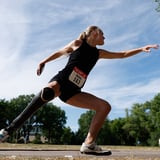
@jessie_heims 5 words you should know when watching the Paralympics #greenscreen #paralympic #teamusa #tokyo #rush #fyp
♬ Happy and fun corporate music for advertising. - TimTaj
NBC will broadcast the Tokyo Paralympics in primetime for the first time ever this year - as well as a record 1,200 total hours across platforms - and there are so many exciting sports to look forward to (goalball, sitting volleyball, athletics . . . the list goes on!). Paralympic discus thrower Jessica Heims is gearing up for her second Games starting Aug. 24, and she shared a video on TikTok highlighting words to know ahead of time. Some of them may seem simple, but they're important distinctions to make.
Paralympics: The Paralympics officially began in 1960 and are "parallel" to the Olympic Games (the first Paralympic Winter Games were held in 1976). The word is derived from the Greek preposition "para" that means "beside" or "alongside." Elite athletes worldwide qualify to compete on the largest stage for disabled athletes.
Paralympian: Paralympians are these elite athletes who - you guessed it - have competed in at least one Paralympic Games.
Adaptive athlete: Heims notes that all Paralympians are adaptive athletes, meaning they compete with a disability, but not all adaptive athletes go to the Paralympics (much like how only a small percentage of able-bodied athletes go to the Olympics). Heims points out that not every person uses adaptive equipment like prosthetics and racing chairs. "It's very important to remember that not every disability is visible," she says.
Guide athlete: These are able-bodied athletes who act as aides for Paralympic athletes during field of play. Heims also refers to them as "handlers," and they may be called "sighted guides," too. In track and field specifically, vision-impaired athletes are tethered to their guides. "Many sports have a version of a guide or a handler, and they are not always tethered the same way that track and field athletes are," Heims explains. For instance, cycling guide athletes are "pilots," and they sit in front of a two-person tandem bike. An Olympic Channel documentary, The Invisible Bond, details stories of vision-impaired athletes and their guides. Guide athletes reportedly started receiving medals at the 2012 Paralympics.
Classifications: Athletes at the Paralympics are placed into different classifications, represented by letters and numbers, based on their disability and how their disability impacts the sport. Each sport has its own classifications for vision and hearing impairments, physical impairments to the body, and intellectual impairments (however, goalball, for example, is only played by athletes with vision impairments). Some athletes have challenged how the International Paralympic Committee (IPC) classifies an athlete's disability and which disabilities are considered eligible. The latest IPC Athlete Classification Code, published in 2015, is under a three-year review.
To learn more about Team USA, visit TeamUSA.org. The Tokyo Paralympics begin August 24 on NBC.


0 Commentaires